You are using an out of date browser. It may not display this or other websites correctly.
You should upgrade or use an alternative browser.
You should upgrade or use an alternative browser.
A Blueprint for Reparations
- Thread starter VAiz4hustlaz
- Start date
That's all I wanted to bring up.
I'd advise everyone to get copies of census, military, or educational documents to prove your ancestors were here. Don't wait.
Right on, bruh!!!
DAMN!!!!! THATS SUM GOOD AZZ ADVICE, WE ALL SHOULD CONSIDER!!! ✌
Sticky'd. OK. Y'all really thing it'll happen, huh?
Consider how we spent the stimulus check money and unemployment money that reparations money would be right back in the economy
Fuck outta here with the dumb, uninformed, myopic comments please.
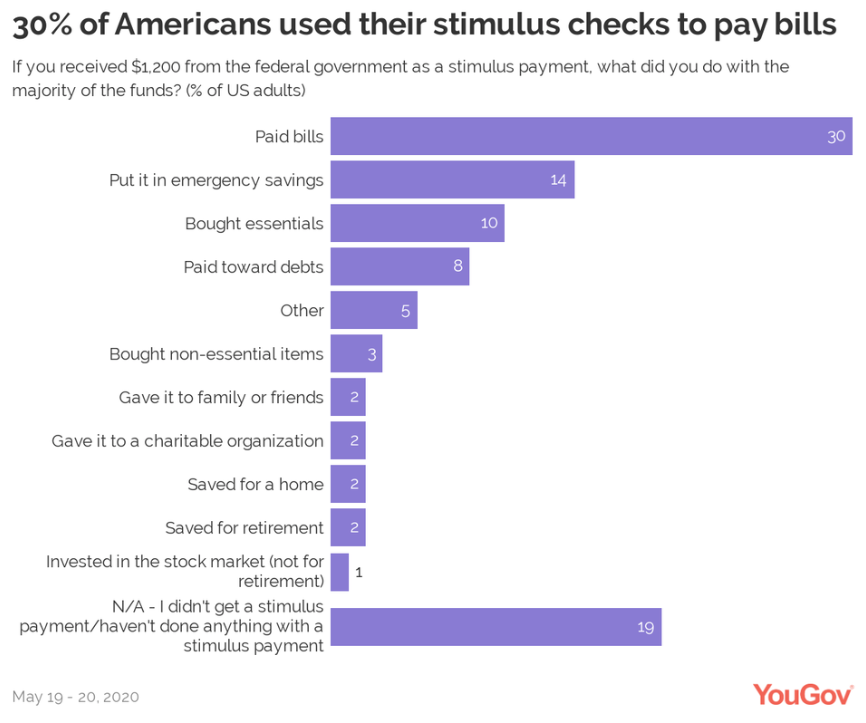
‘It’s alarming to look at how many Americans used these funds to keep a roof over their head’
.......
Nearly one-third (30%) of people said they used their stimulus checks to pay bills, according to a survey released this week, another sign that Americans are struggling to make ends meet, particularly with more than 38 million people filing for unemployment since mid-March.
Those bills — including for cellphones, utilities, cable TV and rent — are the No. 1 priority, even more than purchasing essentials and “relief spending” on apparel, televisions, video games, sporting goods and toys at Walmart WMT, -0.07%, Costco COST, -0.12% and Target TGT, 0.02%.
......
“Americans are aware of how grim the near future could be, and they took the opportunity to use the stimulus funds to help prepare them for it. By paying off debt, consumers free up some credit so they can turn to it, should they find themselves out of a job in the near future,” it added.
......
Other recent findings support the theory that people are struggling to pay bills most of all. As Americans have received their $1,200 stimulus checks, many have used it to keep a roof over their head and food on the table, according to separate research by a team of economists.
......
“Given the size of the 2020 stimulus checks, we might have expected large impacts on categories like automobile spending, electronics, appliances, and home furnishings,” wrote economists from Columbia University, Northwestern University, the University of Chicago and the University of Southern Denmark.
......
“Instead, it seems that individuals are catching up with rent and bill payments as well as engaging in spending on food, personal care and nondurables,” it said. That research analyzed the spending and saving habits of more than 1,600 people who received their stimulus checks by April 21.
The study, distributed this month by the National Bureau of Economic Research, provides another look at how the coronavirus outbreak and its economic consequences suddenly left many American families cash-strapped — especially those making lower incomes.
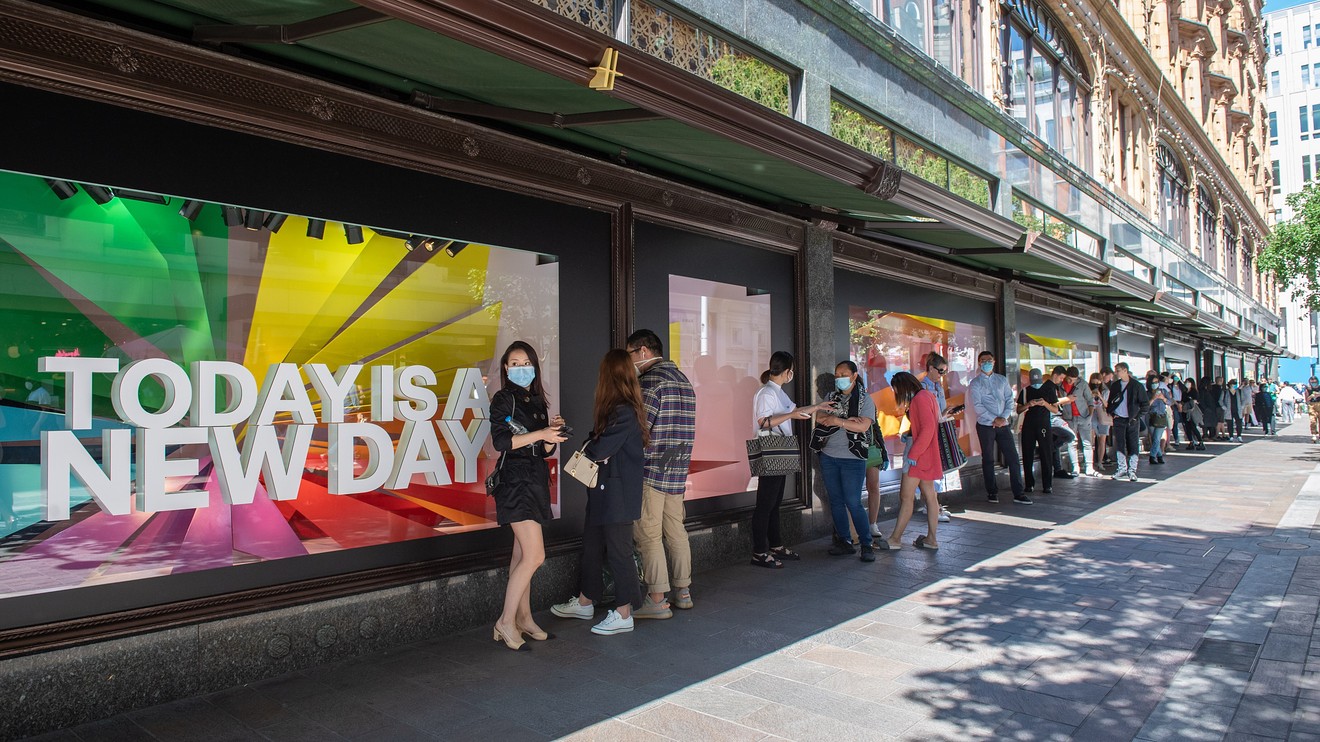
‘It’s alarming to look at how many Americans used these funds to keep a roof over their head’
U.S. retail sales jumped by 17.7% in May. Economists polled by MarketWatch had forecast an 8.5% increase.
The economic prospects of Black Americans have stayed largely unchanged for decades. Here are 12 charts demonstrating alarming rates of inequality.
Joseph Zeballos-Roig
Jun 10, 2020
A participant holding a Black Lives Matter sign at the protest. Protesters by the thousands converged at Grand Army Plaza in Brooklyn marching down Flatbush Avenue to decry the death of 46-year-old George Floyd at the hands of a Minneapolis police officer, with demonstrators denouncing acts of racism and police brutality across the country. Erik McGregor/LightRocket via Getty Images
In recent weeks, protests against police brutality have swept American cities large and small. They come in the wake of the coronavirus pandemic that killed Black people at disproportionately higher rates.
But the wave of Black Lives Matter demonstrations is also shedding renewed light on persistent inequality between whites and Blacks which has formed a cornerstone of American life for generations.
Black Americans have borne the brunt of the economic fallout of the pandemic, losing jobs at a faster pace compared to whites. Experts say these gaps have served to stagnate the finances and reduce the economic security of Black people, setting back their chances for upward mobility and, as a result, a fair shot at prosperity.
Valerie Wilson, the director of the left-leaning Economic Policy Institute's program on race, ethnicity, and the economy, says the existence of racism erects systemic barriers within the economy that harm the financial wellbeing of Black people.
"Racism generates exclusion, discrimination, oppression, exploitation in a number of ways," Wilson told Business Insider. "It's not just physical violence."
Wilson said the pandemic could further accelerate inequality between white and Black Americans.
As a group, Black Americans are significantly less likely to have wealth and savings to fall back on after a job loss. And they're likelier to lose work early on when the economy craters, which has prompted economists to characterize the issue as "first fired, last hired."
Here are 12 charts that illustrate the alarming inequality between white and Black Americans across the economy.
The unemployment rate for Black Americans spiked at a higher rate compared to white Americans.
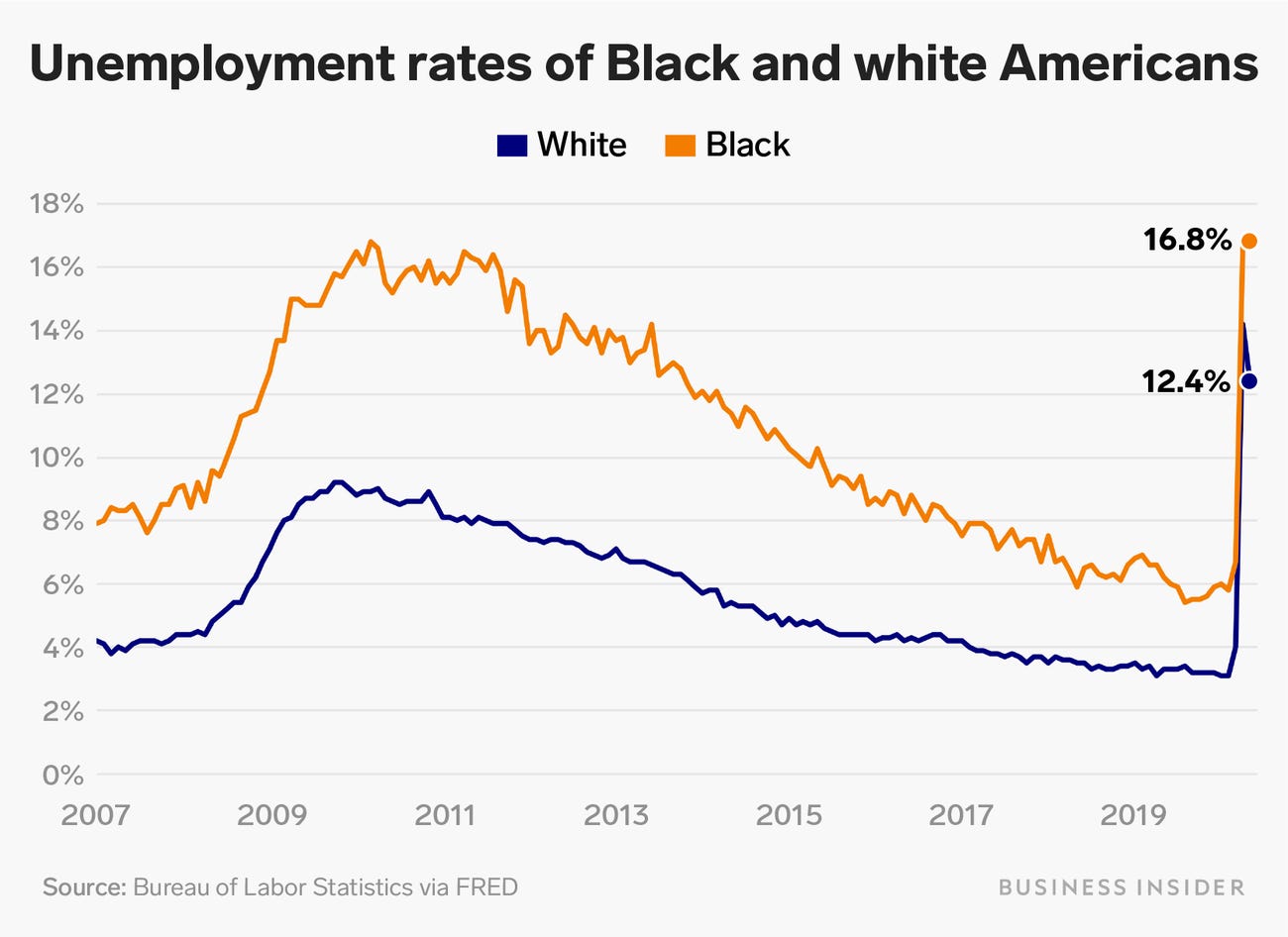
Andy Kiersz/Business Insider
The chart above illustrates the percentage of unemployed workers in the labor force for whites and Blacks. According to the Bureau of Labor Statistics, the Black unemployment rate stands at 16.8% as of May, ticking upward from the previous month and rivaling its peak during the Great Recession.
In comparison, the white unemployment rate is at 12.4%, a drop from 14.2% back in April. The trend suggests Black workers are encountering barriers trying to jump back into the workforce.
"It's the same story," Olugbenga Ajilore, senior economist at the Center for American Progress, previously told Business Insider. "Going into a recession, African Americans are the first ones to lose their jobs, and then when we have a recovery, they're the last ones to gain."
The white unemployment rate has usually been around half the Black unemployment rate since the 1970s, the earliest period with available data, Business Insider's Madison Hoff and Andy Kiersz reported.
Just less than half of all Black adults are currently employed in the US.
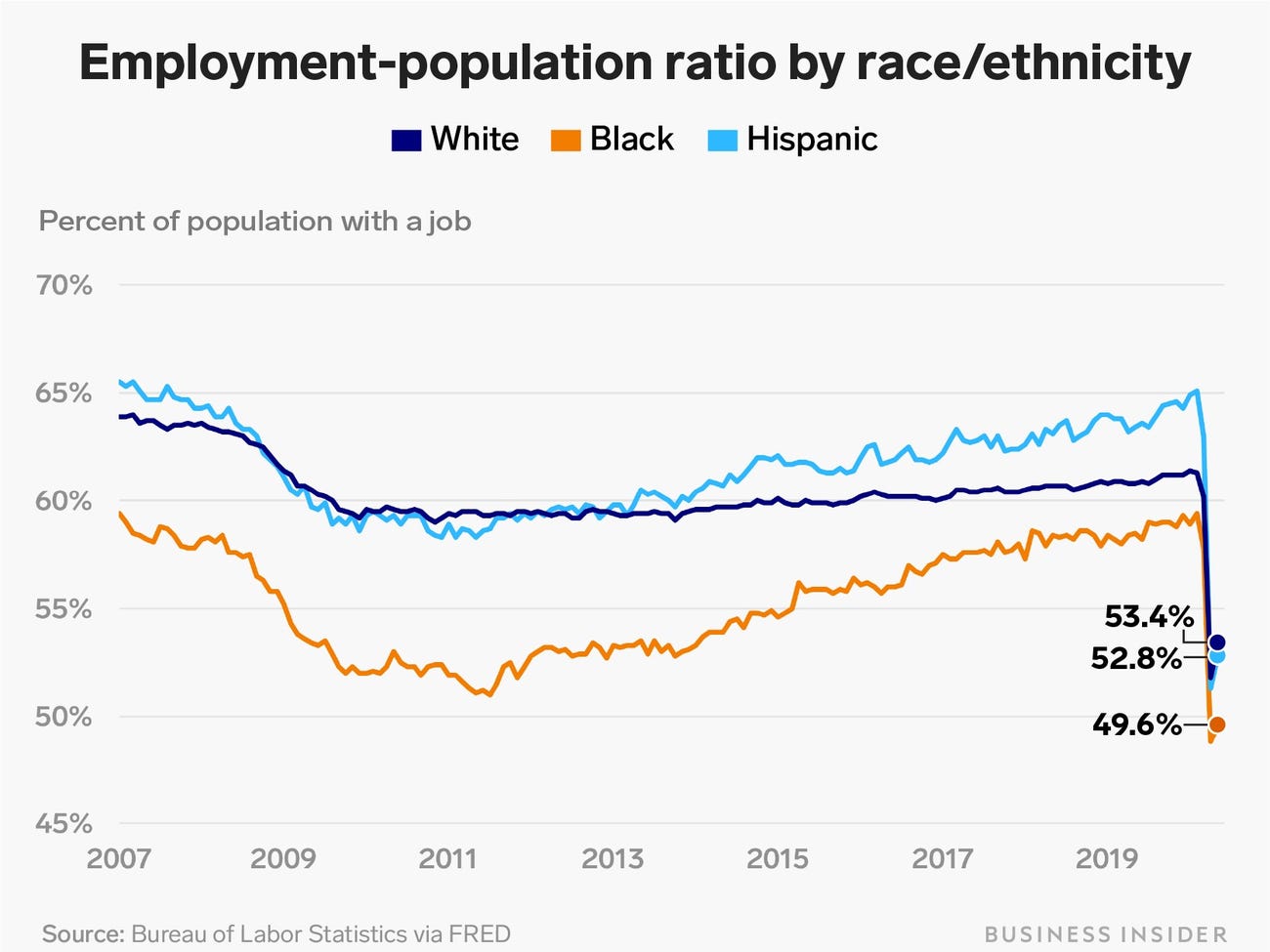
Andy Kiersz/Business Insider
Before the onset of the pandemic, nearly 60% of Black adults were employed. But the outbreak ravaged the low-paid, close-contact service sector, and now just less than half of Black people are employed.
Many, though, already had fragile financial situations even during the record economic expansion, compounding inequality.
Data from the Economic Policy Institute indicates Black households had $8,762 cash on hand on average — starkly lower than the $49,529 that white households had amassed on average.
Recently, Federal Reserve Chair Jerome Powell said that low-income workers have experienced the worst of the economic fallout.
"The pandemic is falling on those least able to bear its burdens. It is a great increaser of inequality," he said. "It is low-paid workers in the service industries who are bearing the brunt of this, it is also women to an extraordinary degree."
The household wealth of white Americans is 17x higher than that of Black Americans.
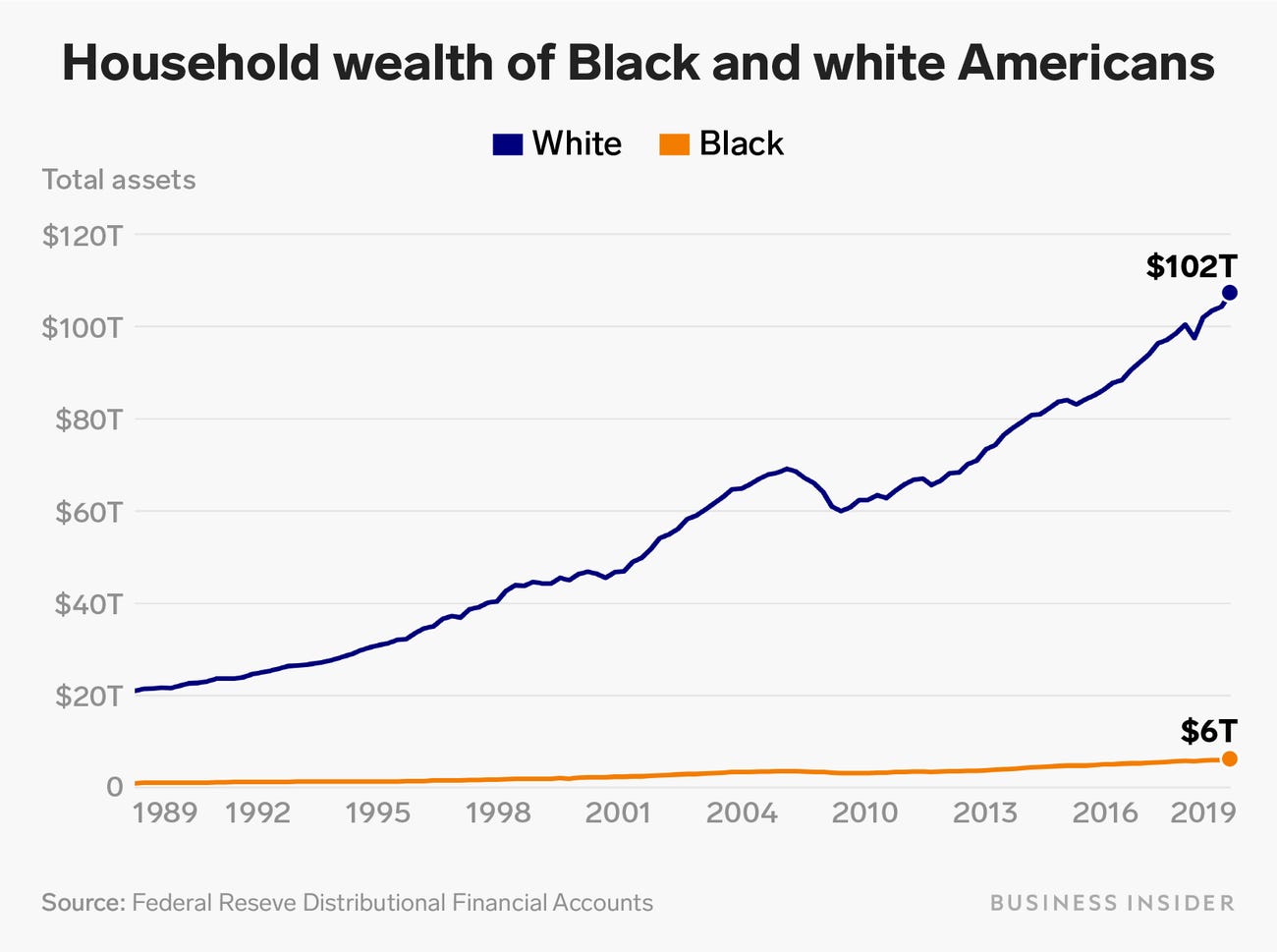
Madison Hoff/Business Insider
Another stark indicator of the inequality between Black and white Americans is the huge gap in household wealth as illustrated above. For Black Americans, household wealth has barely budged in three decades and is estimated to be around $6 trillion.
Meanwhile, white households have stockpiled over $102 trillion in wealth.
Wealth is traditionally accumulated through homeownership, stocks, high wages, or other means. But Black Americans lack easy access to these levers of prosperity and it's a hurdle to building wealth over generations.
The per-capita income of Black Americans is much lower compared to white Americans.
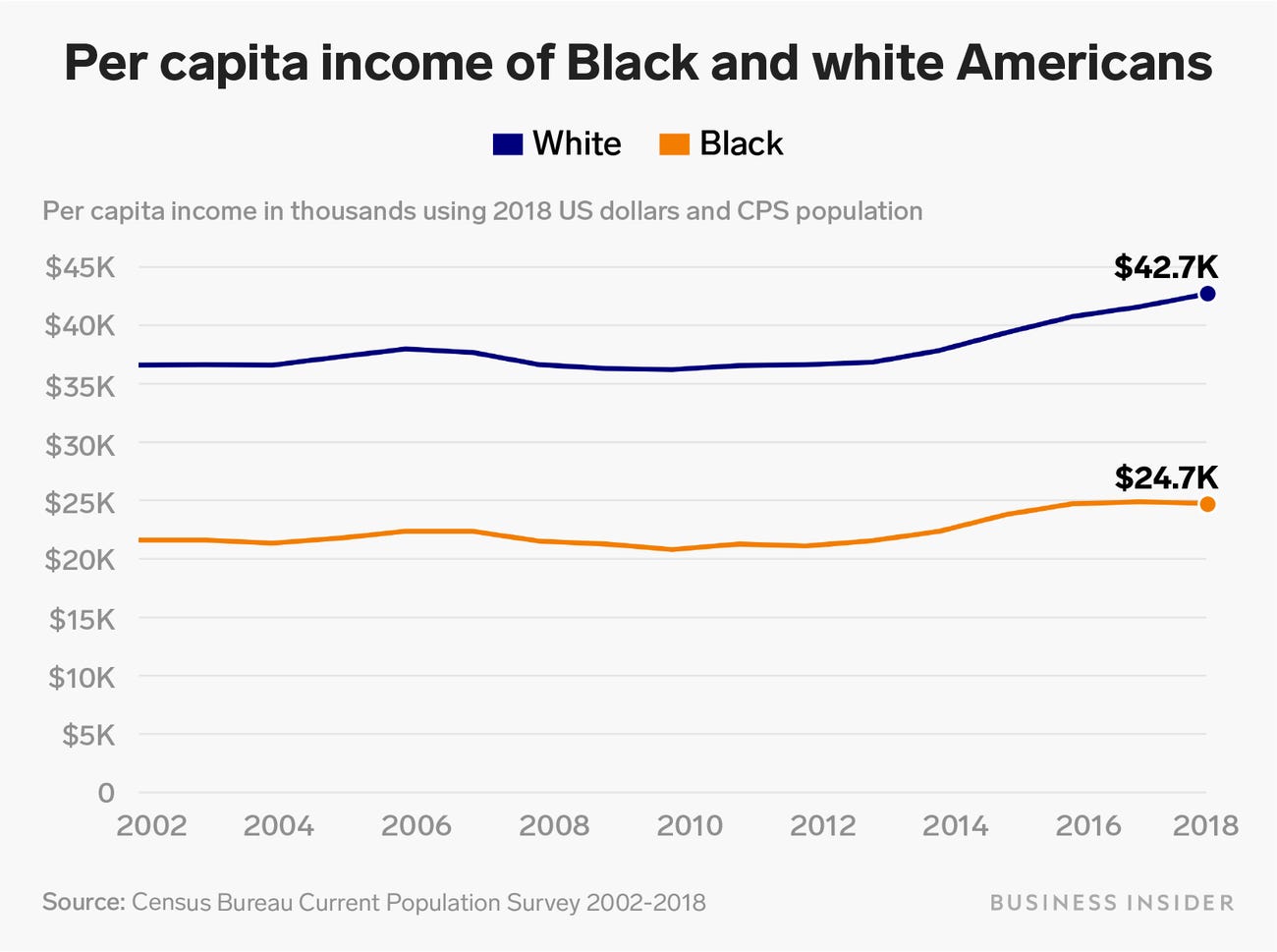
Madison Hoff/Business Insider
Per-capita income measures the amount each person earns in a certain city or region.
Black Americans earn around $24,700 each year, a significantly lower amount when compared to whites, who around $42,700 annually on average. The trend illustrated above indicates that Black people consistently earn less than whites.
Some experts say that's the product of their concentration in the service industries, but others point out that Blacks are underrepresented in the upper rungs of the nation's corporate life — as well as many other high-paying jobs in the health and information sectors.
Mary Daly, president of the San Francisco Fed, said in an analysis that the gap in earnings couldn't be explained by traditional economic models.
"This implies that factors that are harder to measure—such as discrimination, differences in school quality, or differences in career opportunities—are likely to be playing a role in the persistence and widening of these gaps over time," she wrote in 2017.
Black women draw around two-thirds the average earnings of a white man.
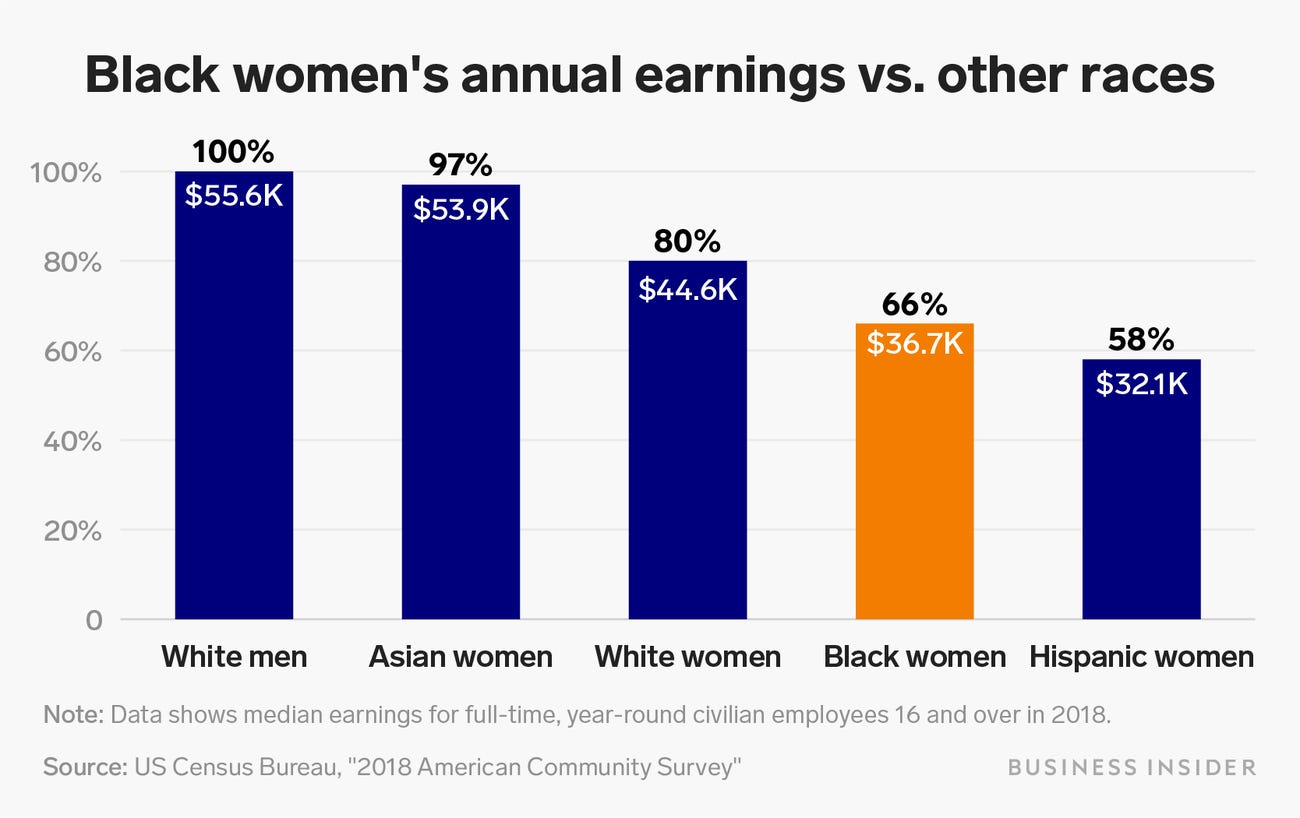
Shayanne Gal/Business Insider
When it comes to wages, Black women make 66% the average earnings of white men, who earn around $55,600 annually on average.
That means that Black women make roughly $36,700 each year on average, earning more than Hispanic women but less than both white and Asian women.
Experts say that Black women weather two different types of bias along the lines of gender and race.
"Intersectional discrimination perpetuates the racial and gender wealth gaps, limits Black women's access to educational opportunities, and impedes their career advancement," the American Association of University Women, a nonprofit organization, said in an analysis.
Put another way, a Black woman has to work 226 additional days to earn the average salary of a white man.
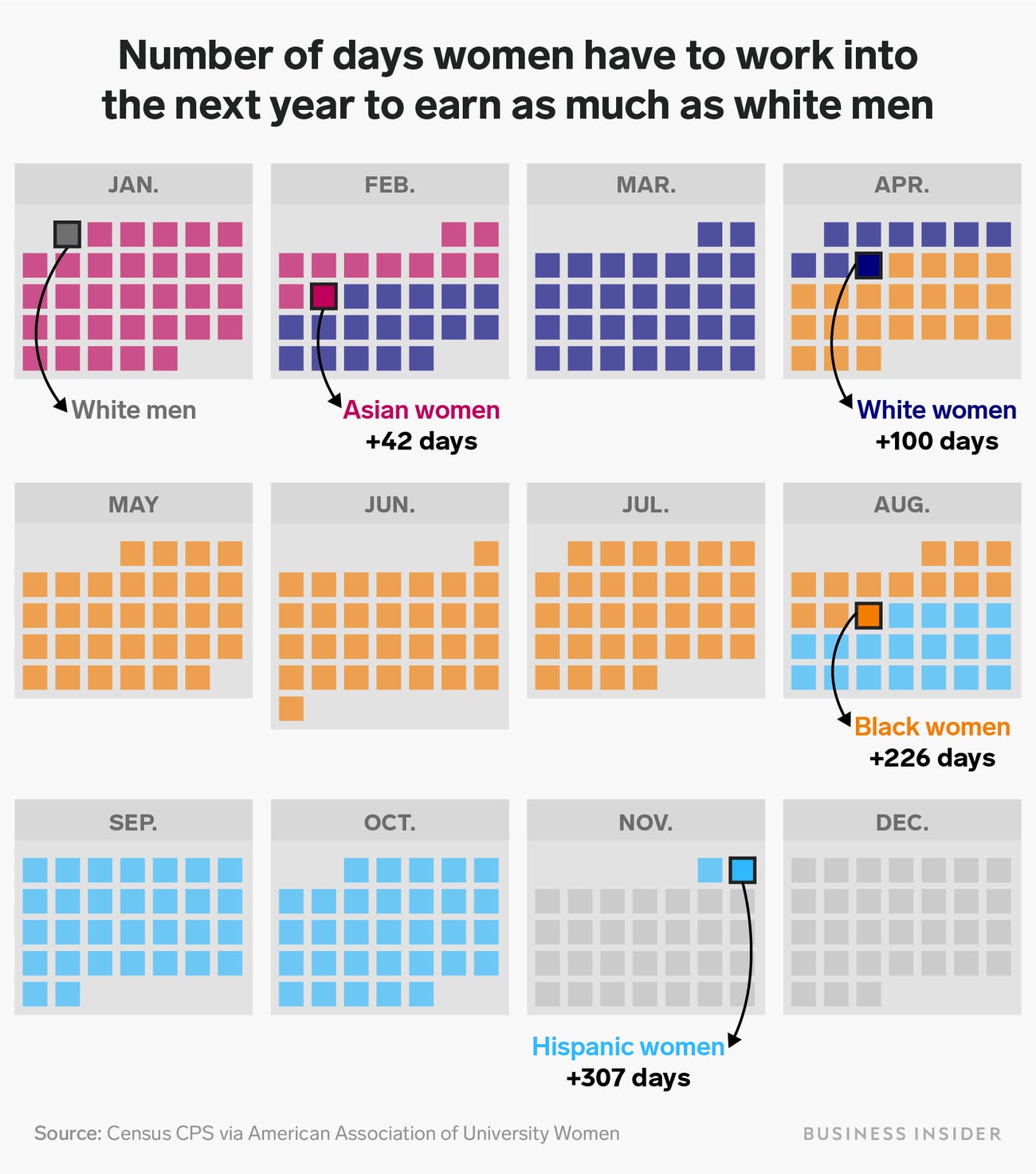
Shayanne Gal/Business Insider
That gender pay gap also indicates that Black women have to work an additional 226 days into the next year in order to earn the same amount as a white man.
Only a Hispanic woman has to work more than a Black woman — 307 additional days.
White women must work just over three months to break even.
In 25 states with the largest shares of Black women working full-time in the labor force, their pay ranges from 47 to 67 cents for each dollar paid to white men, according to the National Partnership for Women and Families.
Black workers are more likely to work in high-risk jobs deemed essential during the pandemic — whether that's in healthcare, a grocery store, or public transit.
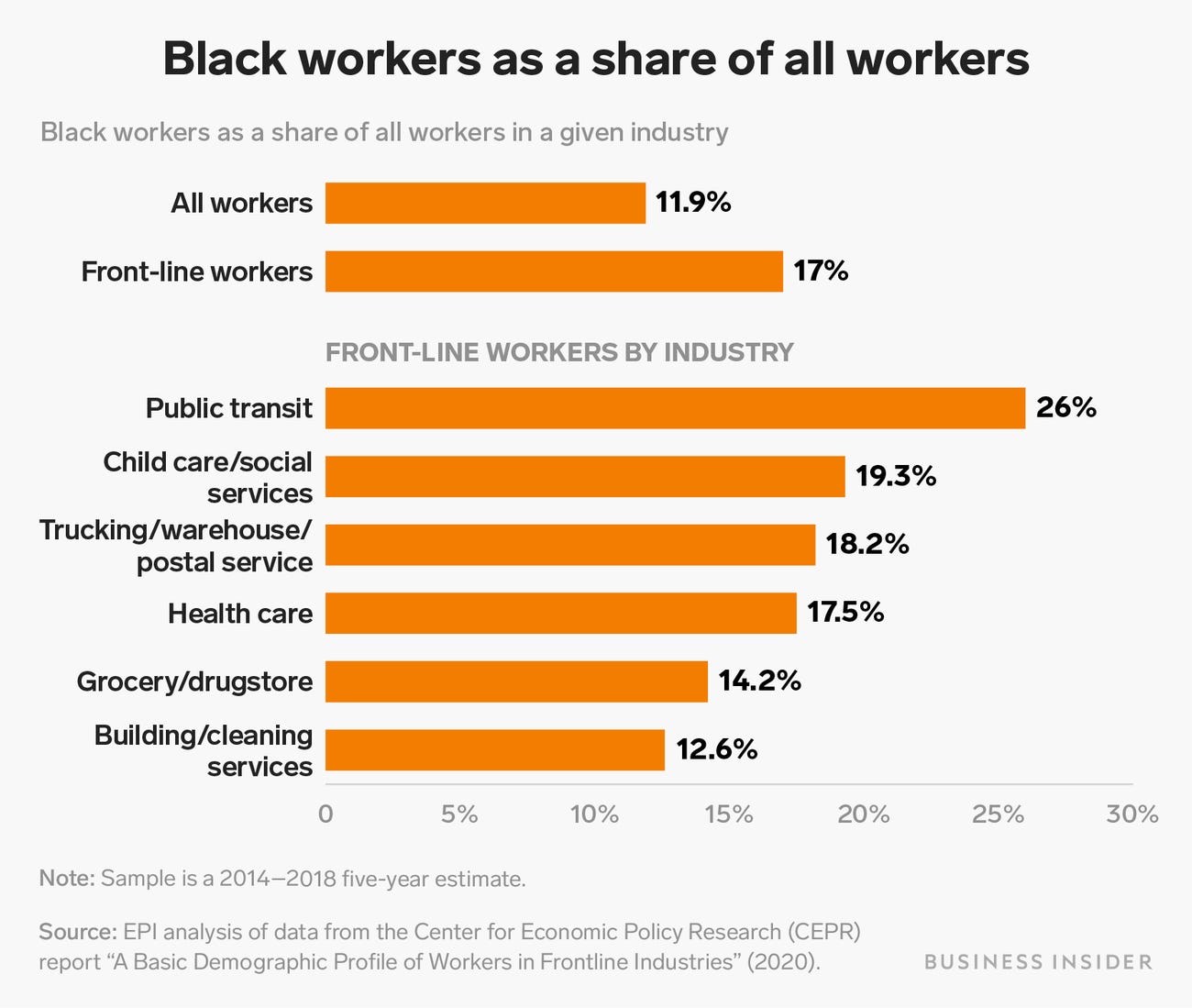
Shayanne Gal/Business Insider
Jobs ruled to be essential were held by a significant share of Black Americans. Much of this work can't be done from home, which increases the health risks for essential workers throughout the pandemic.
While Black workers make up one in nine workers (11.9%) in the labor force overall, they account for one of every six frontline industry workers, or 17%, according to an Economic Policy Institute analysis.
Democrats have called to provide hazard pay to essential workers such as grocery store and health employees, since many earn low wages and risk their health by simply showing up for work.
Black people have been hospitalized at nearly twice their share of the population.
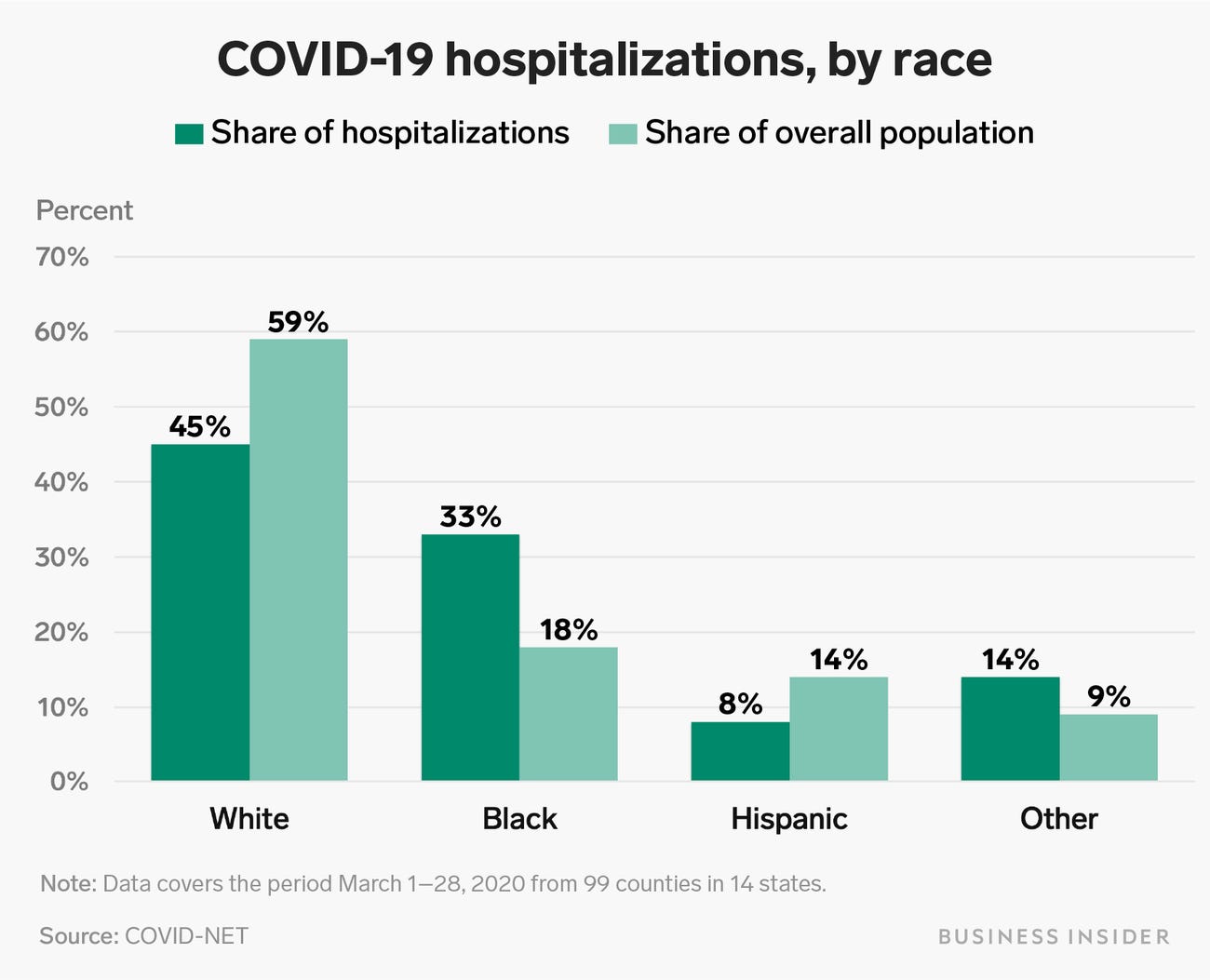
Andy Kiersz/Business Insider
The chart above illustrates that Black Americans were disproportionately hospitalized by the coronavirus at a rate twice their share of the population.
Among the factors experts have highlighted to explain the trend are underlying health conditions that put Blacks at greater risk from COVID-19 — the respiratory illness caused by coronavirus — such as hypertension, diabetes, and asthma.
Many also lack access to quality medical care, which can lead to fewer visits to the doctor's office and regular checkups that could detect coronavirus symptoms in patients.
Black adults are uninsured at double the rate of white adults.
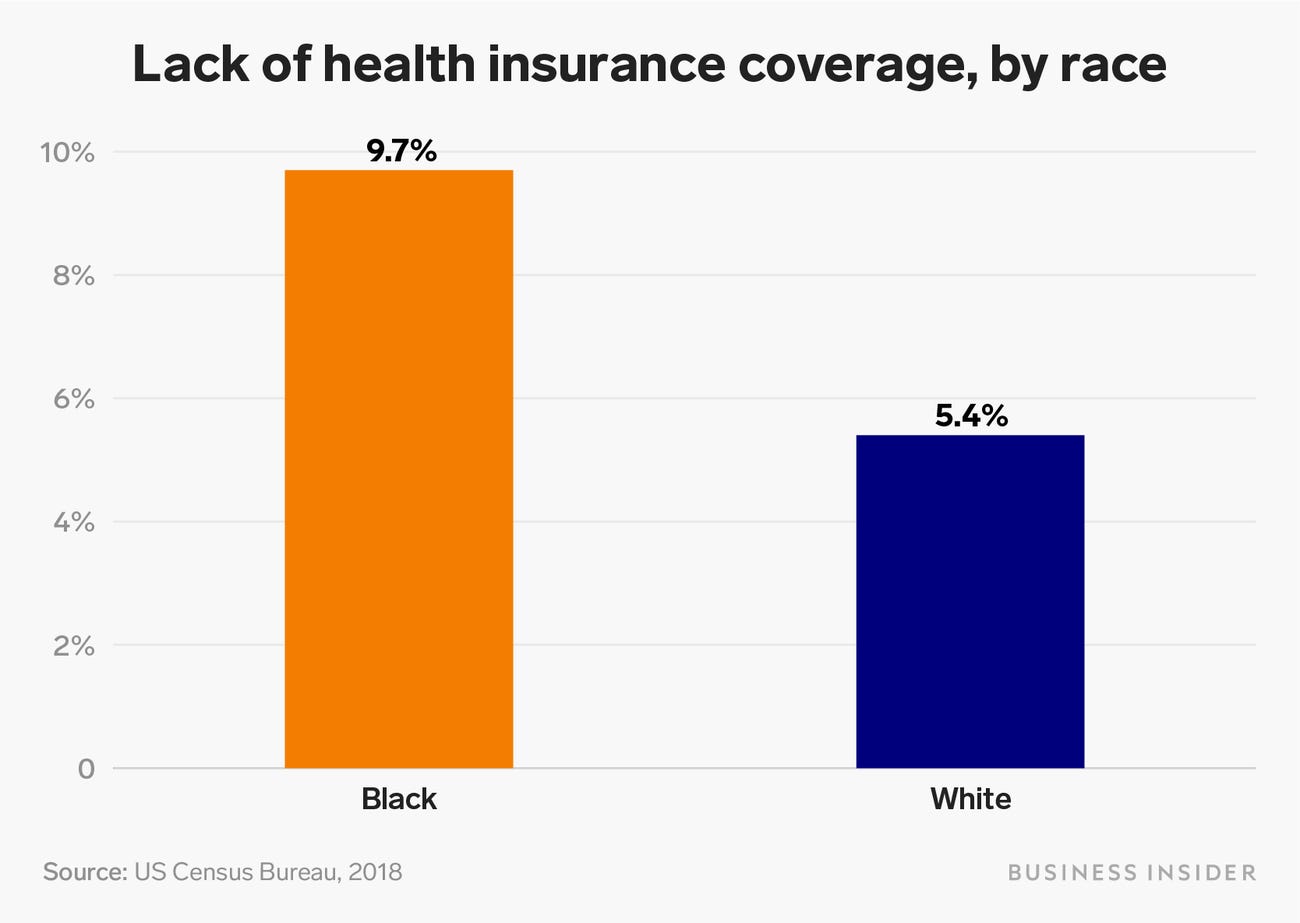
Shayanne Gal/Business Insider
Black people are uninsured at nearly twice the rate of whites, as shown above. Roughly 10.7% of Blacks do not have health insurance compared to 5.4% of whites.
Lacking health insurance is often connected to the decision to delay seeking healthcare barring one's turn for the worst.
During the pandemic, experts say this threatened to create another systemic barrier that put Black Americans at greater risk from the coronavirus.
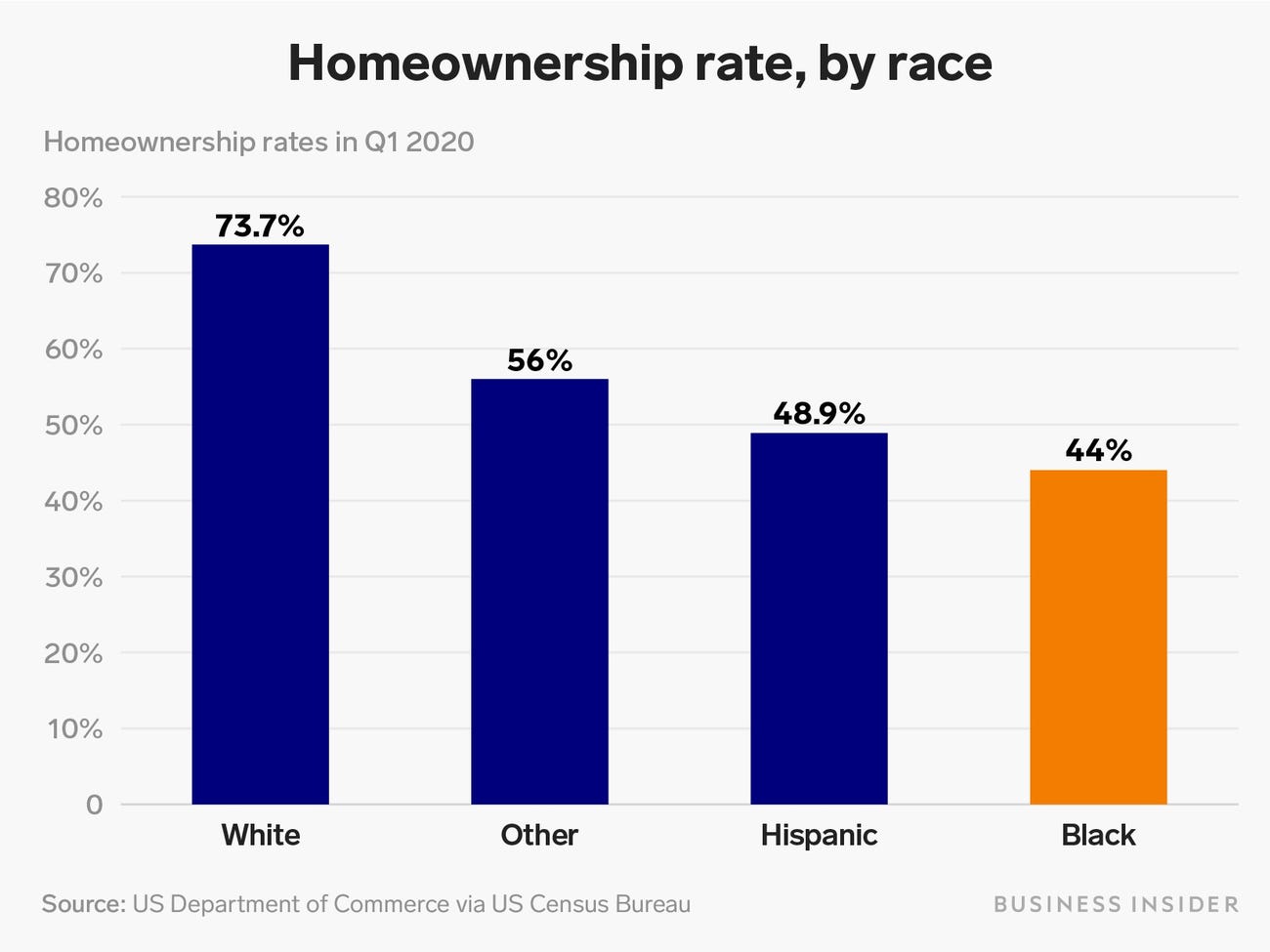
Shayanne Gal/Business Insider
The Black homeownership rate stands at 44% while white homeownership levels are nearly 74% — a 30-percentage-point gap. The level of Black families owning a home is little changed from the 1960s.
Homeownership generally provides families with a means to accumulate wealth over many years — as long as the economy is in a healthy state.
The Great Recession prompted a dip in the number of Black homeowners. But experts say reasons for the disparity vary for other reasons as well, such as a lack of affordable housing and rising amount of debt among young buyers.
Each Black-owned home, though, is also systematically devalued by the housing market by at least $48,000 on average, per research from the Brookings Institution, another factor that hobbles wealth accumulation.
Black people are the likeliest of any racial group in the US to have their application for a home loan rejected.
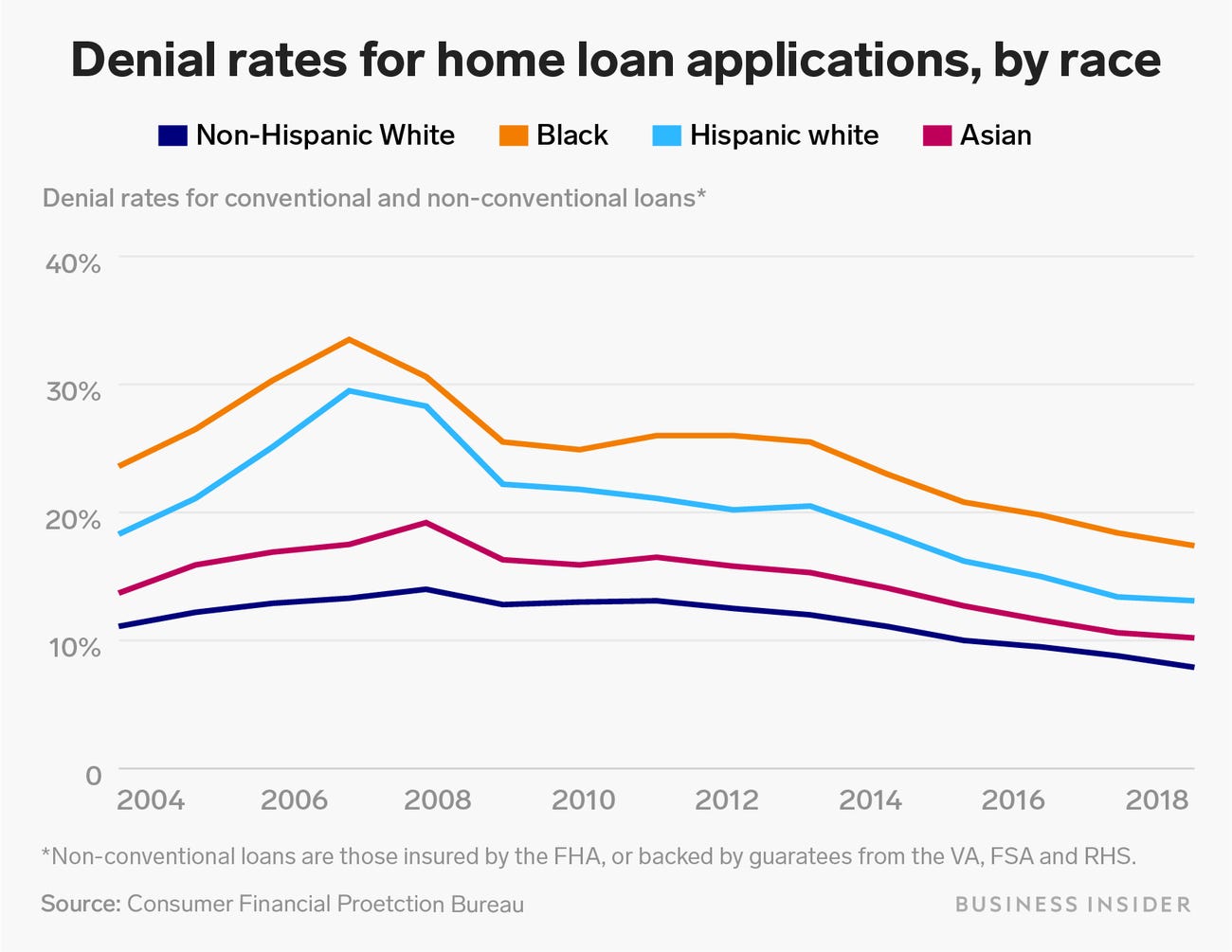
Ruobing Su/Business Insider
Black adults experience the highest rate of denied home loan applications at 18.4%, which contributes to lower homeownership rates. By comparison, it's 8.8% for whites.
The data from the Consumer Financial Protection Bureau found lenders cited debt-to-income ratio as well as credit histories when rejecting applicants.
However, the analysis also found that Black borrowers were more likely to be charged higher interest rates, or "higher priced" as defined by the government, even when they were able to secure a loan.
One in five Black Americans lives below the poverty line — or around $26,000 for a family of four.
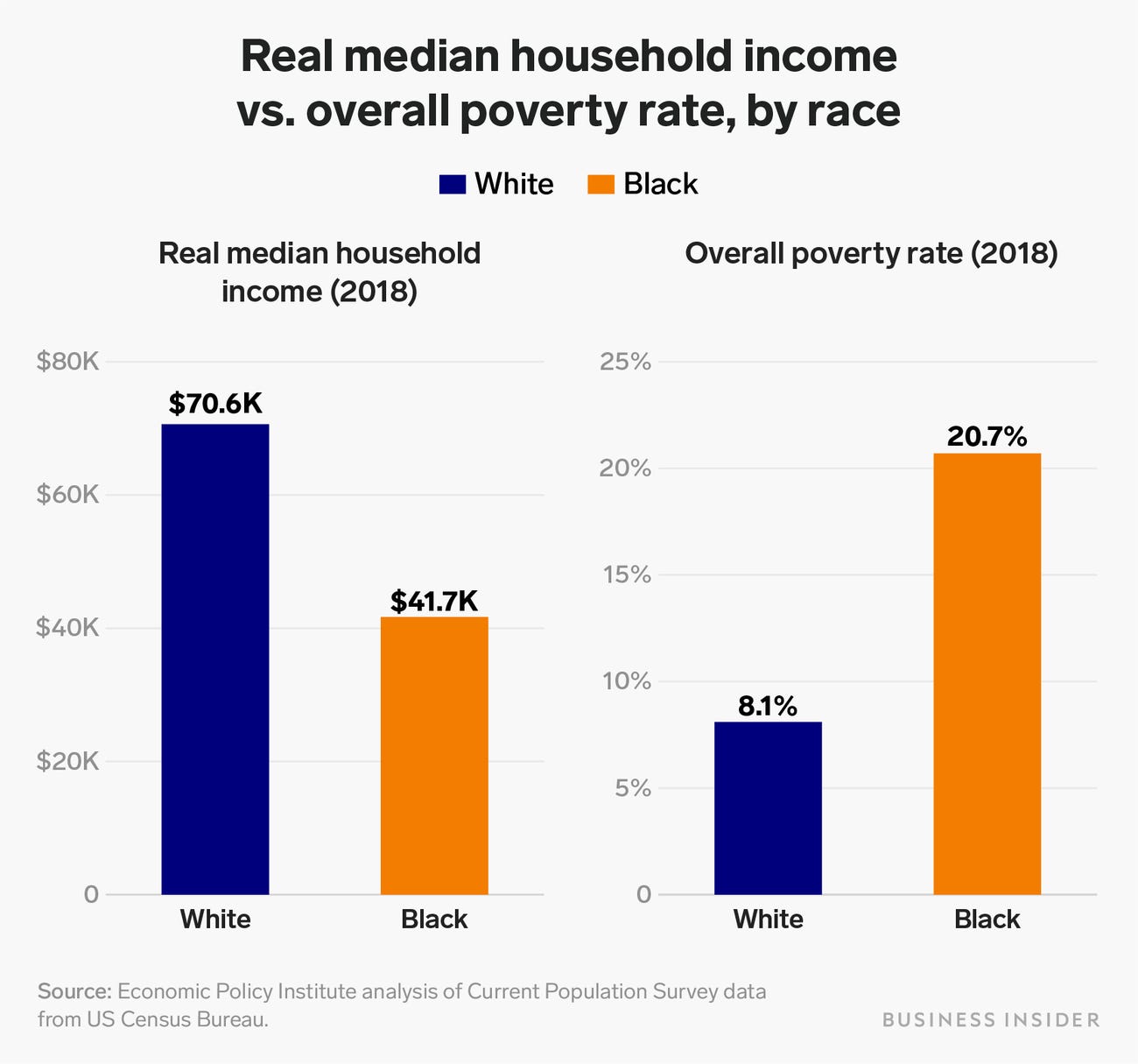
Shayanne Gal/Business Insider
A large gap in median household income means that Black Americans fall into poverty at more than double the rate of whites.
The Census Bureau reported that roughly 20% of Black Americans live in poverty — or under $26,000 for a family of four.
The significant gaps of income also help explain why it's proven extremely difficult for many Black people to build a sizable financial cushion to weather recessions such as the one triggered by the pandemic.
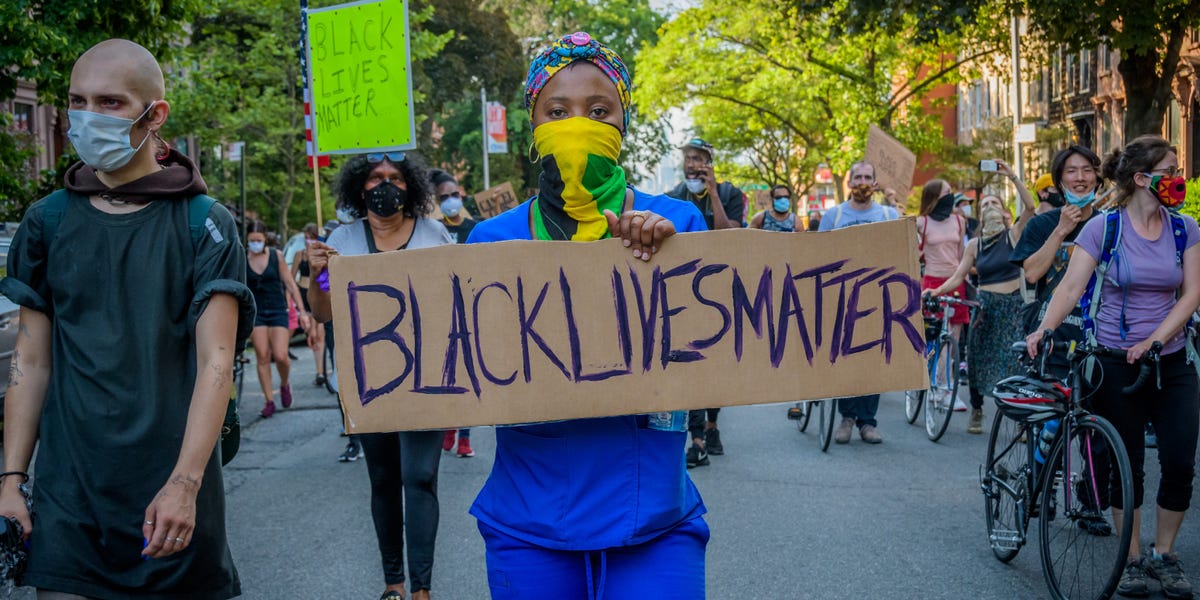
 www.businessinsider.com
www.businessinsider.com
Joseph Zeballos-Roig
Jun 10, 2020
A participant holding a Black Lives Matter sign at the protest. Protesters by the thousands converged at Grand Army Plaza in Brooklyn marching down Flatbush Avenue to decry the death of 46-year-old George Floyd at the hands of a Minneapolis police officer, with demonstrators denouncing acts of racism and police brutality across the country. Erik McGregor/LightRocket via Getty Images
- The recent wave of Black Lives Matter protests against police brutality are also serving to highlight gaping economic inequality between white and Black Americans.
- These gaps have served to stagnate the financial wellbeing of Black people for generations, experts say.
- "Racism generates exclusion, discrimination, oppression, exploitation in a number of ways," Valerie Wilson, a director at the Economic Policy Institute, told Business Insider.
- Twelve charts show racial disparities in unemployment rates, household wealth, earnings, and other economic indicators.
- Visit Business Insider's homepage for more stories.
In recent weeks, protests against police brutality have swept American cities large and small. They come in the wake of the coronavirus pandemic that killed Black people at disproportionately higher rates.
But the wave of Black Lives Matter demonstrations is also shedding renewed light on persistent inequality between whites and Blacks which has formed a cornerstone of American life for generations.
Black Americans have borne the brunt of the economic fallout of the pandemic, losing jobs at a faster pace compared to whites. Experts say these gaps have served to stagnate the finances and reduce the economic security of Black people, setting back their chances for upward mobility and, as a result, a fair shot at prosperity.
Valerie Wilson, the director of the left-leaning Economic Policy Institute's program on race, ethnicity, and the economy, says the existence of racism erects systemic barriers within the economy that harm the financial wellbeing of Black people.
"Racism generates exclusion, discrimination, oppression, exploitation in a number of ways," Wilson told Business Insider. "It's not just physical violence."
Wilson said the pandemic could further accelerate inequality between white and Black Americans.
As a group, Black Americans are significantly less likely to have wealth and savings to fall back on after a job loss. And they're likelier to lose work early on when the economy craters, which has prompted economists to characterize the issue as "first fired, last hired."
Here are 12 charts that illustrate the alarming inequality between white and Black Americans across the economy.
The unemployment rate for Black Americans spiked at a higher rate compared to white Americans.
Andy Kiersz/Business Insider
The chart above illustrates the percentage of unemployed workers in the labor force for whites and Blacks. According to the Bureau of Labor Statistics, the Black unemployment rate stands at 16.8% as of May, ticking upward from the previous month and rivaling its peak during the Great Recession.
In comparison, the white unemployment rate is at 12.4%, a drop from 14.2% back in April. The trend suggests Black workers are encountering barriers trying to jump back into the workforce.
"It's the same story," Olugbenga Ajilore, senior economist at the Center for American Progress, previously told Business Insider. "Going into a recession, African Americans are the first ones to lose their jobs, and then when we have a recovery, they're the last ones to gain."
The white unemployment rate has usually been around half the Black unemployment rate since the 1970s, the earliest period with available data, Business Insider's Madison Hoff and Andy Kiersz reported.
Just less than half of all Black adults are currently employed in the US.
Andy Kiersz/Business Insider
Before the onset of the pandemic, nearly 60% of Black adults were employed. But the outbreak ravaged the low-paid, close-contact service sector, and now just less than half of Black people are employed.
Many, though, already had fragile financial situations even during the record economic expansion, compounding inequality.
Data from the Economic Policy Institute indicates Black households had $8,762 cash on hand on average — starkly lower than the $49,529 that white households had amassed on average.
Recently, Federal Reserve Chair Jerome Powell said that low-income workers have experienced the worst of the economic fallout.
"The pandemic is falling on those least able to bear its burdens. It is a great increaser of inequality," he said. "It is low-paid workers in the service industries who are bearing the brunt of this, it is also women to an extraordinary degree."
The household wealth of white Americans is 17x higher than that of Black Americans.
Madison Hoff/Business Insider
Another stark indicator of the inequality between Black and white Americans is the huge gap in household wealth as illustrated above. For Black Americans, household wealth has barely budged in three decades and is estimated to be around $6 trillion.
Meanwhile, white households have stockpiled over $102 trillion in wealth.
Wealth is traditionally accumulated through homeownership, stocks, high wages, or other means. But Black Americans lack easy access to these levers of prosperity and it's a hurdle to building wealth over generations.
The per-capita income of Black Americans is much lower compared to white Americans.
Madison Hoff/Business Insider
Per-capita income measures the amount each person earns in a certain city or region.
Black Americans earn around $24,700 each year, a significantly lower amount when compared to whites, who around $42,700 annually on average. The trend illustrated above indicates that Black people consistently earn less than whites.
Some experts say that's the product of their concentration in the service industries, but others point out that Blacks are underrepresented in the upper rungs of the nation's corporate life — as well as many other high-paying jobs in the health and information sectors.
Mary Daly, president of the San Francisco Fed, said in an analysis that the gap in earnings couldn't be explained by traditional economic models.
"This implies that factors that are harder to measure—such as discrimination, differences in school quality, or differences in career opportunities—are likely to be playing a role in the persistence and widening of these gaps over time," she wrote in 2017.
Black women draw around two-thirds the average earnings of a white man.
Shayanne Gal/Business Insider
When it comes to wages, Black women make 66% the average earnings of white men, who earn around $55,600 annually on average.
That means that Black women make roughly $36,700 each year on average, earning more than Hispanic women but less than both white and Asian women.
Experts say that Black women weather two different types of bias along the lines of gender and race.
"Intersectional discrimination perpetuates the racial and gender wealth gaps, limits Black women's access to educational opportunities, and impedes their career advancement," the American Association of University Women, a nonprofit organization, said in an analysis.
Put another way, a Black woman has to work 226 additional days to earn the average salary of a white man.
Shayanne Gal/Business Insider
That gender pay gap also indicates that Black women have to work an additional 226 days into the next year in order to earn the same amount as a white man.
Only a Hispanic woman has to work more than a Black woman — 307 additional days.
White women must work just over three months to break even.
In 25 states with the largest shares of Black women working full-time in the labor force, their pay ranges from 47 to 67 cents for each dollar paid to white men, according to the National Partnership for Women and Families.
Black workers are more likely to work in high-risk jobs deemed essential during the pandemic — whether that's in healthcare, a grocery store, or public transit.
Shayanne Gal/Business Insider
Jobs ruled to be essential were held by a significant share of Black Americans. Much of this work can't be done from home, which increases the health risks for essential workers throughout the pandemic.
While Black workers make up one in nine workers (11.9%) in the labor force overall, they account for one of every six frontline industry workers, or 17%, according to an Economic Policy Institute analysis.
Democrats have called to provide hazard pay to essential workers such as grocery store and health employees, since many earn low wages and risk their health by simply showing up for work.
Black people have been hospitalized at nearly twice their share of the population.
Andy Kiersz/Business Insider
The chart above illustrates that Black Americans were disproportionately hospitalized by the coronavirus at a rate twice their share of the population.
Among the factors experts have highlighted to explain the trend are underlying health conditions that put Blacks at greater risk from COVID-19 — the respiratory illness caused by coronavirus — such as hypertension, diabetes, and asthma.
Many also lack access to quality medical care, which can lead to fewer visits to the doctor's office and regular checkups that could detect coronavirus symptoms in patients.
Black adults are uninsured at double the rate of white adults.
Shayanne Gal/Business Insider
Black people are uninsured at nearly twice the rate of whites, as shown above. Roughly 10.7% of Blacks do not have health insurance compared to 5.4% of whites.
Lacking health insurance is often connected to the decision to delay seeking healthcare barring one's turn for the worst.
During the pandemic, experts say this threatened to create another systemic barrier that put Black Americans at greater risk from the coronavirus.
Shayanne Gal/Business Insider
The Black homeownership rate stands at 44% while white homeownership levels are nearly 74% — a 30-percentage-point gap. The level of Black families owning a home is little changed from the 1960s.
Homeownership generally provides families with a means to accumulate wealth over many years — as long as the economy is in a healthy state.
The Great Recession prompted a dip in the number of Black homeowners. But experts say reasons for the disparity vary for other reasons as well, such as a lack of affordable housing and rising amount of debt among young buyers.
Each Black-owned home, though, is also systematically devalued by the housing market by at least $48,000 on average, per research from the Brookings Institution, another factor that hobbles wealth accumulation.
Black people are the likeliest of any racial group in the US to have their application for a home loan rejected.
Ruobing Su/Business Insider
Black adults experience the highest rate of denied home loan applications at 18.4%, which contributes to lower homeownership rates. By comparison, it's 8.8% for whites.
The data from the Consumer Financial Protection Bureau found lenders cited debt-to-income ratio as well as credit histories when rejecting applicants.
However, the analysis also found that Black borrowers were more likely to be charged higher interest rates, or "higher priced" as defined by the government, even when they were able to secure a loan.
One in five Black Americans lives below the poverty line — or around $26,000 for a family of four.
Shayanne Gal/Business Insider
A large gap in median household income means that Black Americans fall into poverty at more than double the rate of whites.
The Census Bureau reported that roughly 20% of Black Americans live in poverty — or under $26,000 for a family of four.
The significant gaps of income also help explain why it's proven extremely difficult for many Black people to build a sizable financial cushion to weather recessions such as the one triggered by the pandemic.
The economic prospects of Black Americans have stayed largely unchanged for decades. Here are 12 charts demonstrating alarming rates of inequality.
Racial disparities exist in the unemployment rate, earnings, and household wealth. Experts say it stagnates the financial wellbeing of Black people.
Fuck outta here with the dumb, uninformed, myopic comments please.

‘It’s alarming to look at how many Americans used these funds to keep a roof over their head’
.......
Nearly one-third (30%) of people said they used their stimulus checks to pay bills, according to a survey released this week, another sign that Americans are struggling to make ends meet, particularly with more than 38 million people filing for unemployment since mid-March.
Those bills — including for cellphones, utilities, cable TV and rent — are the No. 1 priority, even more than purchasing essentials and “relief spending” on apparel, televisions, video games, sporting goods and toys at Walmart WMT, -0.07%, Costco COST, -0.12% and Target TGT, 0.02%.
......
“Americans are aware of how grim the near future could be, and they took the opportunity to use the stimulus funds to help prepare them for it. By paying off debt, consumers free up some credit so they can turn to it, should they find themselves out of a job in the near future,” it added.
......
Other recent findings support the theory that people are struggling to pay bills most of all. As Americans have received their $1,200 stimulus checks, many have used it to keep a roof over their head and food on the table, according to separate research by a team of economists.
......
“Given the size of the 2020 stimulus checks, we might have expected large impacts on categories like automobile spending, electronics, appliances, and home furnishings,” wrote economists from Columbia University, Northwestern University, the University of Chicago and the University of Southern Denmark.
......
“Instead, it seems that individuals are catching up with rent and bill payments as well as engaging in spending on food, personal care and nondurables,” it said. That research analyzed the spending and saving habits of more than 1,600 people who received their stimulus checks by April 21.
The study, distributed this month by the National Bureau of Economic Research, provides another look at how the coronavirus outbreak and its economic consequences suddenly left many American families cash-strapped — especially those making lower incomes.

‘It’s alarming to look at how many Americans used these funds to keep a roof over their head’
U.S. retail sales jumped by 17.7% in May. Economists polled by MarketWatch had forecast an 8.5% increase.www.marketwatch.com
Always one or two,, huh???
When it comes to reparations, differences in black lineage matter
Blacks who are the descendants of slaves and black immigrants have divergent histories, levels of wealth
What we are now witnessing with reparations has been 400 years in the making. And while some will say there have been attempts to trigger a reparations discussion, it is undeniable that the latest push has a significantly different feel and energy. Arguably not since the Reconstruction era have we seen reparations being talked about so seriously and in such a high-profile way. From former presidential candidate Marianne Williamson, with whom I discussed how reparations should be structured, to Tom Steyer, a former candidate for president who has been highly supportive of the issue, these are undoubtedly unique and unprecedented times.
At the root of this development is the American Descendants of Slavery movement, or #ADOS, which I co-founded with Yvette Carnell. #ADOS is a political project built upon our respective YouTube shows — ToneTalks and BreakingBrown — and it arises out of our nation’s failure to contend with its original sin of slavery and the remnants that occurred through Jim Crow. Insofar as a discussion about that outstanding debt now burns in our political discourse, #ADOS helped light the match.
This reparations discussion, however, is not about whether blacks will be disaggregated from a singular oneness.
Rather, #ADOS seeks recognition of what everyone has known for some time: Black people in America are all very different groups who are being carelessly lumped together under the umbrella of blackness. Detractors of the #ADOS movement refuse to acknowledge this truth. They label us "divisive."
Yet, one wonders why when a Haitian, Jamaican or even Nigerian proudly waves his or her respective flag, these same critics are silent. Indeed, there is an almost willful ignorance when it comes to our group’s anchoring in America.
Worse yet is that these attitudes are being espoused in the very country that enslaved my family, and families like mine, for hundreds of years. That enslavement led to trillions of dollars in wealth being stolen from slaves and blacks who are the descendants of slaves. This debt is owed not to the color of blackness, but rather to the specific lineage that fully bears the cost of blackness in America — a cost that is built into the very roots of #ADOS family trees.
To people who ask, “Why differentiate between blacks who were slaves and blacks who came to this country as immigrants long after slavery ended?” I respond that such a question indicates a lack of understanding of the history and economics of this nation.
According to Smithsonian Magazine, the number of black immigrants in America pre-1965 was negligible. At that time, foreign-born blacks made up less than 1% of the black population.
In fact it wasn’t until after 1980, according to the Pew Research Center, that the bulk of black immigrants arrived, more than 15 years after Jim Crow ended with President Lyndon Johnson signing the Civil Rights Act.
The significance of this is revealed in the recent Color of Wealth reports issued by the Federal Reserve. They show that in cities across America, there are massive gaps in wealth holdings between #ADOS and black immigrants. In Los Angeles, for example, native black households have liquid assets with a median value of only $200, compared with $60,000 for African immigrants.
How, then, can someone argue that there is such a thing as "flat" blackness? Such an assertion is effectively anti-reparations and an erasure of American history. It leaves members of the #ADOS community holding the proverbial bag. And if left unchecked it will further fester and overrun the #ADOS community that built this nation. It will leave us in communities like Flint, Michigan, with its poisoned water, and Lowndes County, Alabama, where a United Nations expert on poverty visited and stated that the sewage conditions there were worse than any other he had seen in the developed world.
All of this injustice was birthed from a slice of American history that everyone wants to ignore.
Antonio Moore; Los Angeles
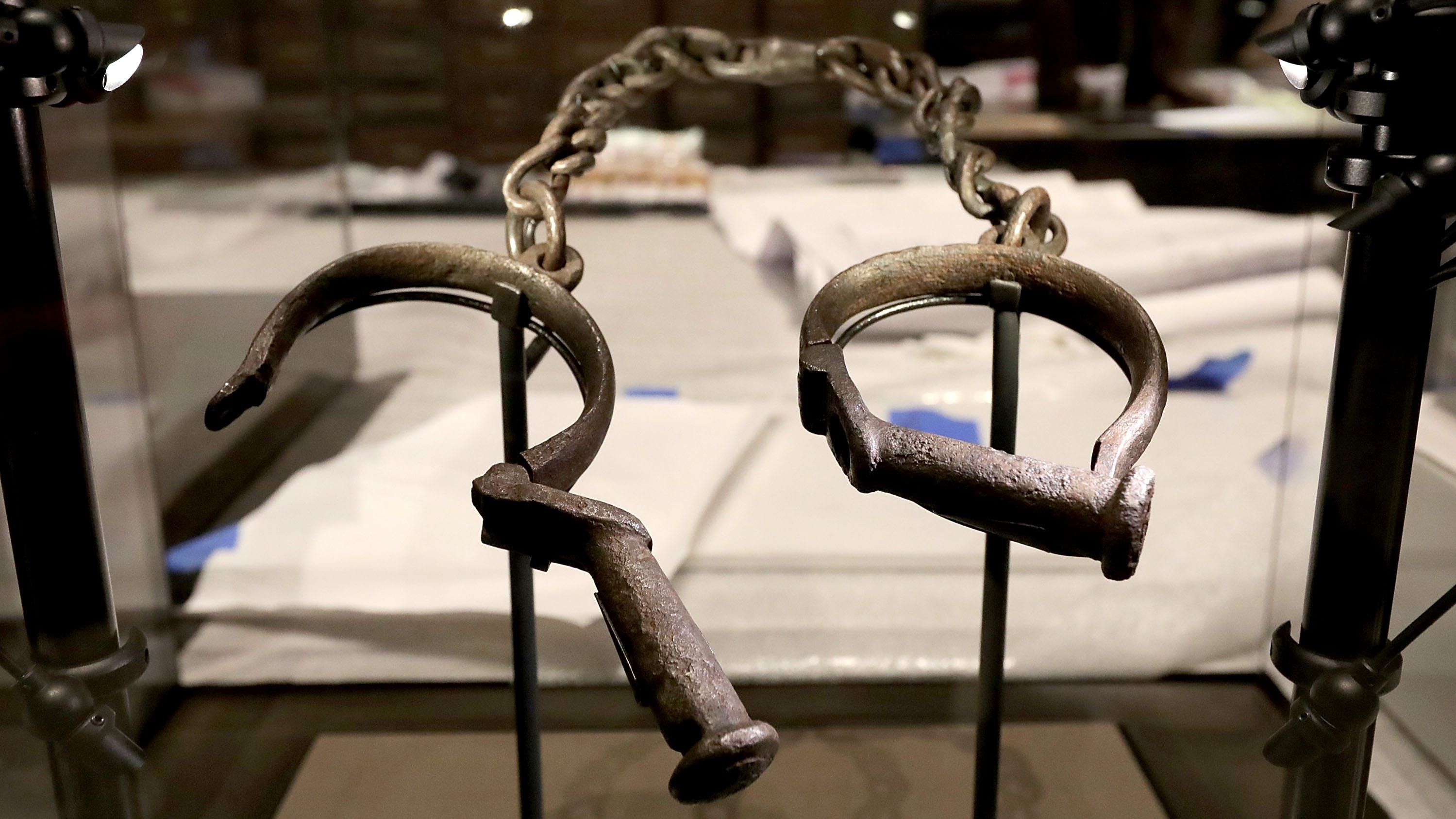
Blacks who are the descendants of slaves and black immigrants have divergent histories, levels of wealth
What we are now witnessing with reparations has been 400 years in the making. And while some will say there have been attempts to trigger a reparations discussion, it is undeniable that the latest push has a significantly different feel and energy. Arguably not since the Reconstruction era have we seen reparations being talked about so seriously and in such a high-profile way. From former presidential candidate Marianne Williamson, with whom I discussed how reparations should be structured, to Tom Steyer, a former candidate for president who has been highly supportive of the issue, these are undoubtedly unique and unprecedented times.
At the root of this development is the American Descendants of Slavery movement, or #ADOS, which I co-founded with Yvette Carnell. #ADOS is a political project built upon our respective YouTube shows — ToneTalks and BreakingBrown — and it arises out of our nation’s failure to contend with its original sin of slavery and the remnants that occurred through Jim Crow. Insofar as a discussion about that outstanding debt now burns in our political discourse, #ADOS helped light the match.
This reparations discussion, however, is not about whether blacks will be disaggregated from a singular oneness.
Rather, #ADOS seeks recognition of what everyone has known for some time: Black people in America are all very different groups who are being carelessly lumped together under the umbrella of blackness. Detractors of the #ADOS movement refuse to acknowledge this truth. They label us "divisive."
Yet, one wonders why when a Haitian, Jamaican or even Nigerian proudly waves his or her respective flag, these same critics are silent. Indeed, there is an almost willful ignorance when it comes to our group’s anchoring in America.
Worse yet is that these attitudes are being espoused in the very country that enslaved my family, and families like mine, for hundreds of years. That enslavement led to trillions of dollars in wealth being stolen from slaves and blacks who are the descendants of slaves. This debt is owed not to the color of blackness, but rather to the specific lineage that fully bears the cost of blackness in America — a cost that is built into the very roots of #ADOS family trees.
To people who ask, “Why differentiate between blacks who were slaves and blacks who came to this country as immigrants long after slavery ended?” I respond that such a question indicates a lack of understanding of the history and economics of this nation.
According to Smithsonian Magazine, the number of black immigrants in America pre-1965 was negligible. At that time, foreign-born blacks made up less than 1% of the black population.
In fact it wasn’t until after 1980, according to the Pew Research Center, that the bulk of black immigrants arrived, more than 15 years after Jim Crow ended with President Lyndon Johnson signing the Civil Rights Act.
The significance of this is revealed in the recent Color of Wealth reports issued by the Federal Reserve. They show that in cities across America, there are massive gaps in wealth holdings between #ADOS and black immigrants. In Los Angeles, for example, native black households have liquid assets with a median value of only $200, compared with $60,000 for African immigrants.
How, then, can someone argue that there is such a thing as "flat" blackness? Such an assertion is effectively anti-reparations and an erasure of American history. It leaves members of the #ADOS community holding the proverbial bag. And if left unchecked it will further fester and overrun the #ADOS community that built this nation. It will leave us in communities like Flint, Michigan, with its poisoned water, and Lowndes County, Alabama, where a United Nations expert on poverty visited and stated that the sewage conditions there were worse than any other he had seen in the developed world.
All of this injustice was birthed from a slice of American history that everyone wants to ignore.
Antonio Moore; Los Angeles
When it comes to reparations, differences in black lineage matter
Blacks who are the descendants of slaves and black immigrants have divergent histories, levels of wealth
www.usatoday.com
I didn't get much in stimulus so I just paid my phone and electric bill with it. There's always going to be a jackass that spends their money like a fool, but in this climate? Nah. You drop a chunk of change on us and a lot will buy land, pay off debt or open a business.
And that is why they haven’t given it yet. The Caucasian’s biggest fear is the so called black man gets confidence in himself and remember why we he was put here and that was to be in rulership.I didn't get much in stimulus so I just paid my phone and electric bill with it. There's always going to be a jackass that spends their money like a fool, but in this climate? Nah. You drop a chunk of change on us and a lot will buy land, pay off debt or open a business.
The Gods Debris plan. Credit ya boy.We should not have to pay any taxes. PERIOD
After Reparations Study Suggests $151 Million for Each African American, Experts Say Money Alone Isn't Enough
How ya like dem apples?
How ya like dem apples?
I haven't watched the vid yet, so I apologize if this was answered.
But who would be eligible for reparations? What would be the determining factors?
ETA:
I watched the vid, my question was answered.
But who would be eligible for reparations? What would be the determining factors?
ETA:
I watched the vid, my question was answered.
Why is the immigrant Sheila Jackson Lee on the committee?
Because us Black Americans are xenophobic. In Africa and other countries they have laws forbidding us serving in Government even after gaining citizenship. Here in America, WS exclusively places immigrants in positions over us to undermine movements. Sheila Jackson Lee should have 0 to do with this.
I haven't watched the vid yet, so I apologize if this was answered.
But who would be eligible for reparations? What would be the determining factors?
ETA:
I watched the vid, my question was answered.
THANK YOU for actually watching and getting your question answered!!!
My family really didnt share their lineage. I dont know my tree that far back going into slavery. I wonder.how I could find out
Prior to 1973, less than one percent of the Black American population was of immigrant descent. Black immigration to the U.S. didn’t really commence until 1980 and ramped up even more so after 2000.
So, as long as you know your parents were ADOS and you’ve personally identified as Black, then you’re good.
todays Jews, native indians (aka white americans & hybrid spaniard mexicans abusing minority set asides), asians etc cant compare their story to ours. our situation was much worse and complex. disturbing reparations to them is easier, cause youre dealing with way less people who got fucked over. its also easier to track down their people. for us, youll have a bunch of NEWLY immigrant Black folks, native africans, domincans, Jamicans, Hatians etc, many who hate Black americans, claiming all the funds that are meant for Black Americans. also, only receiving a direct payment from the US government means that youd be letting businesses, churches, other countries etc off the hook. Also, reparations doesnt have to mean strictly cash. it could be land, valuable stocks (that u can sell sooner than later), part ownership in businesses etc. So yeah. its not as simple as printing out checks, you need to make sure the shit is set up properly- which could take a while. But now is the time to start the conversations (while millions of non Blacks are faking like they care about BLM)
Expound on that further please?Question, if the government required DNA testing to prove it, would you?
Do you mean a certain percentage?
Not even that, 100s of years of documents, military records, articles, death certificates. People who look at Black Americans as "lost" believe prior to the immigration act there is no record of our existence in the US.
I also find people that didnt grow up in a house hold with 2 FBA parents hype up DNA the most.
Maybe we should require these other groups to show us DNA results before we believe they are Jamaican or Haitian or whatever they claim. We need proof from cacs in a lab.
yepNo need. Hundreds of years of census records to prove it.
DNA is a red-herring that the Khazars and white grifters will use to steal even more.
I was able to trace my people to Alabama and Tennessee to late 1800s on Ancestry and also,
My mother and grandmothers kept great records.
in this case,Bro, I've read it.
You know we have lots of black people that crossed over and pretended to be white right?
Nuff said.
if you were claiming that you were white, you'd be exempt.
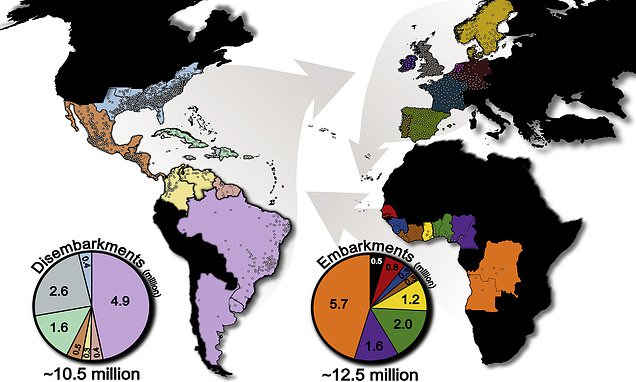
23andMe study shows dark genetic history of transatlantic slave trade
A new DNA study published Thursday sheds fresh light on how the horrors of the transatlantic slave trade - including rape and deaths en route to the Americas - have shaped black genetics.
I can trace roots back to Alabama and Mississippi

23andMe study shows dark genetic history of transatlantic slave trade
A new DNA study published Thursday sheds fresh light on how the horrors of the transatlantic slave trade - including rape and deaths en route to the Americas - have shaped black genetics.www.dailymail.co.uk
Why do you have a problem when we seek to discuss this?
“But Nigerian ancestry was over-represented in African Americans in the US, probably because of the intra-continental slave trade which brought them from the Caribbean.“
Immigrants are your biggest problem, huh?
Herschel Walker’s son, herpes sores and all.
Where in this thread or in the original William Darity video I posted has anyone said immigrants are our biggest problem? What we don’t like are immigrants of ill will and intent inserting themselves into the ADOS reparations discussions. Just as it would be rude if a disingenuous ADOS person to jump into a CDOS reparations discussion with ill intent.
Why do you have a problem when we seek to discuss this?
“But Nigerian ancestry was over-represented in African Americans in the US, probably because of the intra-continental slave trade which brought them from the Caribbean.“
Where in this thread or in the original William Darity video I posted has anyone said immigrants are our biggest problem? What we don’t like are immigrants of ill will and intent inserting themselves into the ADOS reparations discussions. Just as it would be rude if a disingenuous ADOS person to jump into a CDOS reparations discussion with ill intent.
Mr. Met has purposely never discussed or reposted Dr. Darity ever. Do a search, he's very deliberate in not mentioning his name and trying to make people who dont have a background in economics be the "face of reperations". And to always recenter our reparations discussion to immigrants. He post a vid of Herschels faggot son in this thread for what purpose?
Keep in mind Met's Jamaica reparations push failed here and is going nowhere, so he'd prefer the same for us.
Immigrants are your biggest problem, huh?
Herschel Walker’s son, herpes sores and all.

That fruity niccah has got too much sugar in his tank.
I can trace through census, military and marriage records back to the earth 1800's and have a picture of my ancestors that was a colored union soldier during the civil war.Expound on that further please?
Do you mean a certain percentage?
My father's paternal side goes back almost as far to about 1820. There's no birth record for my great grandmother other than maybe a plantation log that says negro female slave baby. Can't prove it was her, but it was passed to my pops she was born a slave.
Moms side there are straight dead ends on her paternal side, but great tracing on her maternal lineage.
Some people don't. About 25% of the information on my family census has incorrect names, birthdays, birth places etc.
If you couldn't prove any of this, but the US wanted to build a database to "find" blood relatives to base your claim on would you?
They have already used us to test Syphilis, Agent Orange, sterilization and god knows what else, I see some in government demanding biological proof to weed out "Reparation Queens" trying to gain access to $.
I think most people have no problem finding their roots.I can trace through census, military and marriage records back to the earth 1800's and have a picture of my ancestors that was a colored union soldier during the civil war.
My father's paternal side goes back almost as far to about 1820. There's no birth record for my great grandmother other than maybe a plantation log that says negro female slave baby. Can't prove it was her, but it was passed to my pops she was born a slave.
Moms side there are straight dead ends on her paternal side, but great tracing on her maternal lineage.
Some people don't. About 25% of the information on my family census has incorrect names, birthdays, birth places etc.
If you couldn't prove any of this, but the US wanted to build a database to "find" blood relatives to base your claim on would you?
They have already used us to test Syphilis, Agent Orange, sterilization and god knows what else, I see some in government demanding biological proof to weed out "Reparation Queens" trying to gain access to $.
Of course there's going to be the person who was adopted who has no idea.
We cant get into percentages because who gets to set that number up? And how much?
90% Black
75%
51%
That's a good recipe for fuckery. Because all of a sudden Wesley Snipe niggas test gonna come back 40% Black and a White Bright cac going to magically get theirs at 99% African. Lol but smh.
As said multiple times already here, if you've been claiming Black for the last few censuses or you put Black on official government documents, you should be good to go on reparations.


